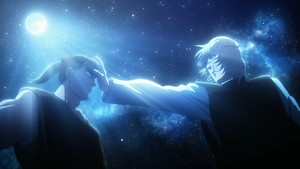
© 魚豊/小学館/チ。 ―地球の運動について—製作委員会
I wonder if Nowak thinks he’s cursed. That necklace just won’t go away. To us, it’s a tangible symbol for the metaphorical torch passed across our litany of main characters. To Nowak, though, it’s a reminder that his work hasn’t accomplished anything. Heliocentrism still lurks in the darkness. Worse, its claws may have scratched his own daughter. I can understand why he’s uncharacteristically frustrated in the second half of this week’s episode. He’s beginning to notice just how violently the world can spin.
In this week’s most verbose scene, Oczy spells out much of what the story has implicitly argued so far. I believe I’ve been pretty on top of that subtext, so I won’t recapitulate it here. I actually would have called this speech redundant and heavy-handed if not for the identity of its orator. It’s important that Oczy stands up to Badeni because it’s the culmination of his character arc. The morose and superstitious mercenary we first met is gone, and he’s been replaced with someone who’s inquisitive, passionate, and engaged with the world and people around him. He doesn’t know all the facts and figures, and he’s only just learned how to read and write, but his mind has all the tools it needs. He’s thinking the big and juicy thoughts that all great thinkers find themselves drawn to. In another life, Oczy would have been a philosopher. If his swordplay is strong enough, maybe he still can.
Badeni’s reaction also reveals signs of growth in that obstinate monk. He doesn’t brush off Oczy’s words. He seriously considers them despite the ticking clock and its rapid acceleration. Peer review is one of the cornerstones of scientific progress, and Badeni’s attitude thus far has been anathema to the concept. Oczy, however, nearly convinces otherwise. Badeni even tells him they need to table their discussion for later. That’s a characteristically curt way for him to end the conversation, but he wouldn’t have phrased it like that if he didn’t want to sincerely continue it. Badeni finally respects Oczy, if not as an equal, then at least as a peer. Oczy, after all, respects the truth enough to divorce his ego from it. He can’t teach Badeni much, but he can teach him that.
The evolution of the relationship between these two unlikely comrades—these brothers in heliocentrism—delivers the episode’s strongest image. Badeni dresses it up in the sacrament of Last Rites, but its core is deeply personal. He anoints Oczy’s head in a gesture that’s both dramatic and tender. The visual framing of the scene also makes it stand out. Most of this episode is wreathed in darkness or illuminated by fire. This one scene, however, is bathed in brilliant moonlight. While it’s colder than the orange hues of fire, it’s also not destructive. It’s a beam of celestial hope that their work might continue, even if the two of them do not. Also, if you didn’t ship the two before this episode, I hope you do now.
The most potent idea that Oczy raises is that we can never truly know what the future will hold. Orb lauds the passing of the scientific torch, and there’s plenty of evidence of its successes, but it lacks any semblance of a guarantee. Rafal’s research could have rotted into obscurity, or it could have been destroyed at the hands of a devout Christian. If Badeni manages to save and pass on his research, it might be refused or refuted by the next generation. Science, ultimately, is a human endeavor, and as such, it can rely solely on logic and reason. Scientists need to believe in what they’re doing, and they also need to trust in their peers and scions. In this manner, we can’t completely divorce science from faith. But it’s not the kind of heaven-seeking faith that Oczy’s existential despair once led him towards. He says that heliocentrism is his faith, but the precise truth is far more terrestrial. Simply put, Oczy now believes in people—people like Badeni, Jolenta, and Gras.
The episode ends on more bloodshed, and once again, Orb surprises with some stylish swashbuckling animation. It’s a quick cut, but it’s enough to grant Oczy the action-hero entrance he’s earned. I like, too, that Orb maintains these tonal diversions from its usual philosophical and loquacious plotting. They mix things up just enough. Even the dark slapstick of the rookie Inquisitor falling on his own sword serves a purpose. It’s a sharp metaphor for the Inquisition as a whole, as the Church’s tightening grip on society only foments more resistance. It’s a familiar irony. Catholicism grew thanks to the stories and influence of its early martyrs, who stood up to power and died for the strength of their beliefs. Now, in the 15th century, Catholics are the persecutors. They’re the ones in power. You don’t inspire heroism that way. It’s Oczy, a heretic who’s ready to be a martyr as he stares down the blade that may kill him.
Rating:
Orb: On the Movements of the Earth is currently streaming on
Netflix.
Steve is on Bluesky now, and he’s okay with that. He is busy pondering the orb. You can also catch him chatting about trash and treasure alike on This Week in Anime.



Leave a Comment